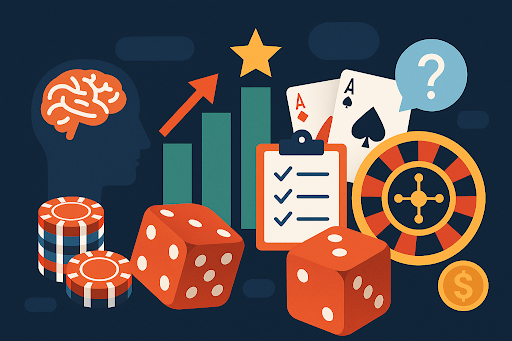The world in which we live is informative. You usually get answers by pressing a few keys on the virtual keyboard or one on your mobile phone. Even with the ability to get information in real time, our brains still think in the same old way. Shortcuts let us process a lot of information, but they often lead to poor choices.
Psychologists describe cognitive biases. They shape how we see things and affect our choices. In the gambling world, they can also impact our wins and losses. In gambling, seven key prejudices stand out among many others. Let’s take a closer look. If you’re curious about bonuses and these patterns, check out the 22Bet login.
Fallacy of the Gambler
Among gambling biases, this one is one of the most well-known. The Gambler’s Fallacy suggests that past events influence future ones. But each event is actually independent.
Many roulette players expect black to show up if the wheel lands on red five times. Every spin has the same red/black probability.
You won’t find this prejudice only in roulette. Lottery participants, sports bettors, and slot machine players typically fall into this trap. Experiments show that bettors have the tendency to vary bets based on latest results. They believe streaks must either end or keep going. Actually, the odds are reset with each new wager.
The Effect of Dunning-Kruger
Confidence devoid of knowledge is this bias’s foundation. People who do not know about a topic have a tendency to think they know more than they actually know.
This can happen in gambling. Someone reads a short article on poker tips or slot machine strategies. Then, they feel like a pro. Believing their “knowledge” offers them a leg up, they could begin to make reckless wagers. Actually, the outcomes of games of chance are always up in the air, and becoming an expert takes a lot of practice.
“A little knowledge can be a dangerous thing,” the adage says. The betting business is the clearest example of this.
Putting Control in Your Hands
Such a bias causes us to believe that we can control unlikely outcomes. The research found this to happen frequently among gamblers. Some slot machines have “nudge” or “hold” buttons. These let players feel they can affect the outcome. The result is already fixed, and the random number generator hasn’t pressed any buttons.
The Bias of Confirmation
People like proving themselves correct. Confirmation bias is when we search for information that confirms our beliefs. We tend to ignore any evidence that challenges them.
Other gamblers think a slot machine is “hot” when it pays off. Some think their sports team will win because they see patterns in the games in the past. When you get two cherries instead of three on a slot machine, you might think your prize is “coming soon.”
The brain sees setbacks as personal failures. It doesn’t view them as signs of future success.
The Impact That Lasts
At other instances, we persist in our views despite evidence to the contrary. This is the effect of continuous influence.
It takes work to liberate oneself from outmoded ideas. It refers to being willing to consider new ideas. You must also be willing to own up when you’re wrong and challenge long-held beliefs.
The Bias of Availability
We show availability bias when we judge the likelihood of something based on how easily it comes to mind.
A non-gambling example is shark attacks. The odds of falling victim to such attacks stand at around 1 to 3.75 million. That’s what you’d likely be told. The tales warp our view of danger because they are so compelling.
Availability bias makes us focus on big wins when we gamble. We often forget about the smaller losses. When we win it big, the memory of all those losses fades, and we find ourselves back at the table or slot machine.
Frequency Illusion
The frequency illusion is tied to availability bias. Once something is on our minds, we start noticing it more. Some gamblers may keep track of their wins in isolation from their losses.
Some people may boast about their “luck” if they win three jackpots in a year. In the midst of it, yet, they may have lost hundreds of lesser wagers. You get a skewed picture of reality if you focus only on the victories.
Does the Impact Vary for Men and Women?
But it’s about more than simply gender. Cognitive biases affect performance differently. This depends on one’s experience, personality, and favored genre of games. Gambling tendencies must be treated as individual cases, not generalities.
7 Real-World Approaches to Conquering Bias
The truth is that no one is perfectly rational. Humans have biases. Recognizing them reduces their influence on our choices. If you gamble, here are seven practical steps to keep in mind:
- Notice your biases. Ask yourself: do I bet out of logic or because of a hunch?
- Treat each bet independently. Past results do not change future probabilities.
- Accept randomness. Chance determines slots, roulette, and dice games. Strategies cannot beat them in the long term.
- Respect complexity. Games such as poker involve deep strategy. Do not think that reading in a few minutes is expertise.
- Hear other views. People can point out blind spots by learning.
- Be flexible. When you acknowledge that you were wrong, then no one will repeat expensive errors.
- Take breaks. Taking a break clears your thoughts and lessens your on-the-spot attempts.
Final Thoughts
Cognitive biases influence our thinking without our awareness. They may cause little blunders in daily life. They may affect significant gambling choices and encourage bad conduct. Self-awareness minimizes risky habits, but no solution eliminates risk.
Pause before betting next time. Ask yourself: Am I being logical or using my brain’s shortcuts? One inquiry may change everything.
Keep an eye for more latest news & updates on Discover Tribune!


